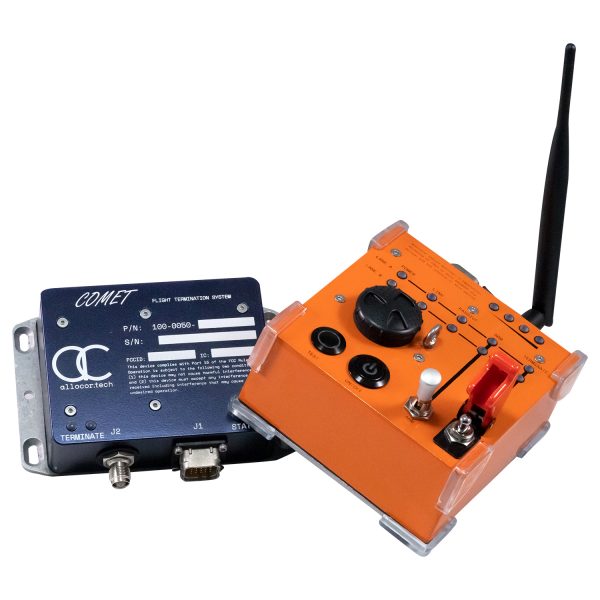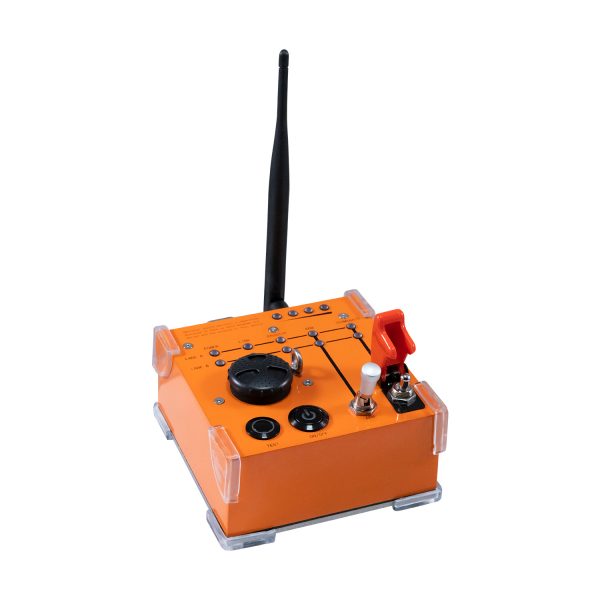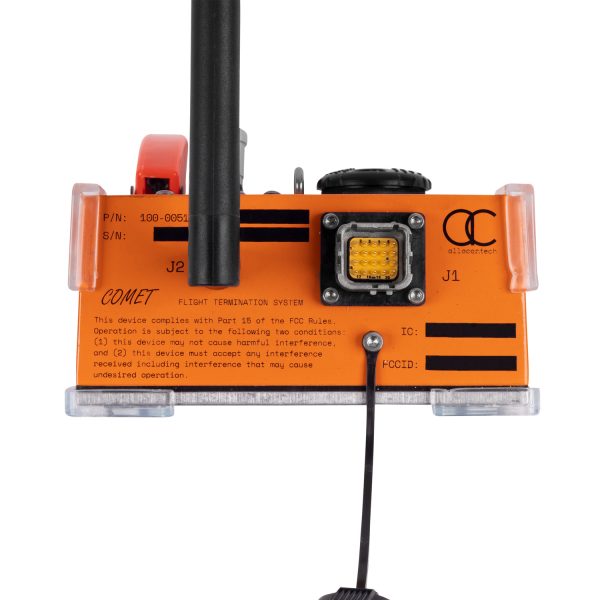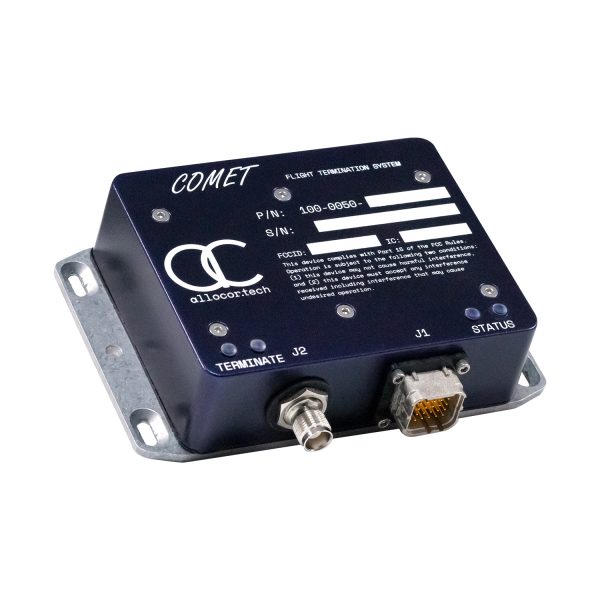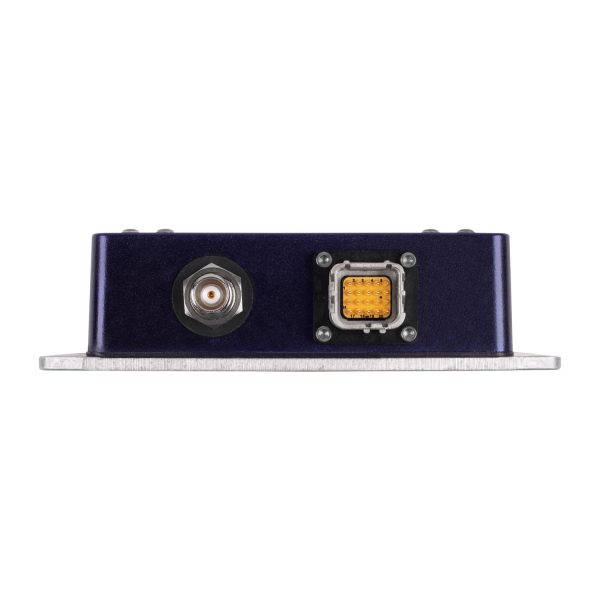Comet is a radio-linked remote-stop or flight termination system with digital, pyrotechnic, CAN-FD, serial, and Ethernet outputs. Designed to ensure no single failure shall cause termination, Comet comes with dual redundant processing and redundant termination circuits. Both the Comet Vehicle and Operator units come with dual Ethernet or dual CAN-FD telemetry links which can be used as a soft source of termination information and source of system diagnostics.
In the standard configuration, a single Vehicle unit supports up to two Operator units in line-of-sight operation. Mesh and repeater options allow beyond-line-of-sight operation and range extension. Protocol extensions allow up to eight Operator units.
A socketed radio solution allows Comet to support many popular bands from 400 MHz to 2.4 GHz and transmit power of up to 4 Watts. Licensed and unlicensed variants are available depending on the country of operation.
Overview
The Comet Vehicle unit has two termination outputs which can be independently configured for positive-logic digital or pyrotechnic ignition function. Termination voting can happen internally or externally, and the output can optionally be latched and held-up for a short period of time.
The Comet Operator unit comes standard with an 8-hour battery, neck lanyard, daylight visible LEDs and a loud buzzer; allowing range safety officers to operate from any location. A rubber duck antenna and neck lanyard is provided as standard, but the unit is also capable of fix location operation via the EN-4165 connector, which can also provide telemetry.
Termination Chain
Radio
Microhard Pico Series
Time shared between processors, independent signing keys
CPU
Dual Independent STMicro STM32H7
400MHz ARM Cortex M-7 with Double Precision Floating Point Unit
2MB Internal Flash
1MB Internal RAM
Voting
Each termination lane has independent Arm, Terminate, and Safe logic assemblies. This structure allows each lane to vote with logical AND, OR, or be lane independent.
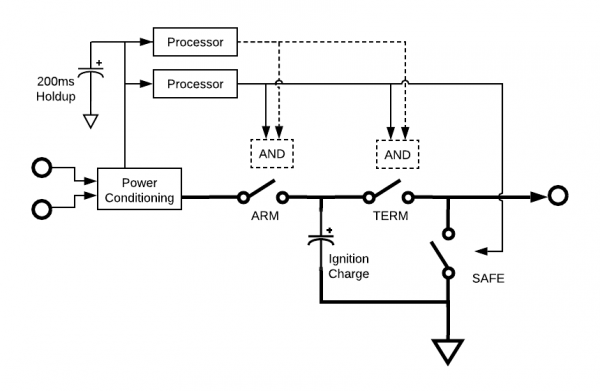
Communication
External to System
Option 1
Dual 10/100 Ethernet
Single RS-232
Option 2
Single 10/100 Ethernet
Dual CAN-FD
Single RS-232
Between Lanes
Optional UART connection between processor lanes for more complex voting and status sharing algorithms.
RF Performance
| Band | TX Power (W) | Sensitivity (dBm) | Range (km) |
|---|---|---|---|
| 400 MHz | 2 | -114 | 110 |
| 840 MHz | 2 | -114 | 50 |
| 866 MHz | 1 | -114 | 35 |
| 869 MHz | 0.5 | -112 | 20 |
| 900 MHz | 1 | -110 | 20 |
| 2.4 GHz | 1 | -112 | 10 |
Range is an estimate and assumes clear line of sight, uniform radiation patterns, 1km receiver altitude, 20dB link margin, and default link rates, bandwidths, and error correction. Real world performance depends on many additional factors.
Physical
Weight
Vehicle Unit: 375g
Dimensions
Vehicle Unit
Length: 5.9 inches
Width: 4.4 inches
Height: 1.6 inches
Modified Hammond 1590BB
Operator Unit
Modified Hammond 1590KK
Mounting
Vehicle Unit
4x countersunk chamfered slots
1x counter sunk electrical bonding stud
Operator Unit
None
Custom base plates for mounting and electrical bonding are possible.
Power
Input Voltage
Vehicle Unit
18 to 30V (nominal)
DO-160G §16.6 Category B
Operator Unit
25.2V maximum charge voltage
Power Consumption
5W typical, unterminated
Meets DO-160G §16.7.5, Inrush
Redundancy
Both types of Comet unit have dual power inputs, internally ORd together with ideal diodes and clamped. This is a common power input feeling a set of shared holdup capacitors and regulators.
Termination power can either be jumped directly to the ORd input rail without clamping and holdup, or after the clamp with holdup.
Enviornmental
Comet FTS was subjected to formal environmental qualification testing. For more information, please contact allocortech.
Temperature
Vehicle Unit:
DO-160G §4.5 Category B2
DO-160G §5 Category B
Operator Unit:
DO-160G §4.5, with minimum temperature of -20°C and maximum of 60°C due to internal battery.
DO-160G §5, with restricted temperature range as above.
Condensing Humidity
DO-160G §10.3.1
Vibration
Vehicle Unit: DO-160G §8 Category R/Fixed-Wing
Operational Shock
Vehicle Unit: DO-160G §7.2 Category A
Altitude
Vehicle Unit: DO-160G §4.6.1 Category B2 (-5k to 25k ft MSL)
Operator Unit: DO-160G §4.6.1 Category B2 (-5k to 8k ft MSL)
Induced Susceptibility
Vehicle Unit: DO-160G §19.3.3 and §19.3.4 Category CW
Drop Resistance
Operator Unit: Operating survival of 7 foot drop onto any corner and any face
Debug
Debugging
JTAG and ST SWI
Programming
Internal JTAG Header, RS-232 ST Bootloader, allocortech bootloader over CAN, RS-232, or Ethernet
Document Number
Title
600-0049-000
100-0050-001
100-0051-001
allocortech has many supported custom configurations of the Comet that can be created upon request. The base part numbers are listed here:
- 100-0050-001 —
COMET FTS Vehicle Unit (Air) ERHHSSLLDD900
- 100-0050-002 —
COMET FTS Vehicle Unit (Air) CPHHVVTTDD900
- 100-0050-003 —
COMET FTS Vehicle Unit (Air) EPHHSSLLDD900
- 100-0050-104 —
COMET FTS Vehicle Unit (Air, Mark II) CPHHVVTTDD9005
- 100-0050-105 —
COMET FTS Vehicle Unit (Air, Mark II) CPHHVVTTDD4005
- 100-0050-106 —
COMET FTS Vehicle Unit (Air, Mark II) CPIIVVLLDD4005
- 100-0051-001 —
COMET FTS Operator Unit (Mark I) EPHHSSTTDD900
- 100-0051-101 —
COMET FTS Operator Unit (Mark II) EPHHSSTTDD9005
- 100-0051-102 —
COMET FTS Operator Unit (Mark II) EPHHSSTTDD4005

